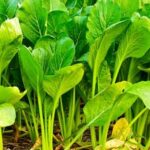Black Cow, a popular organic soil amendment, is known for its rich nutrients and benefits for gardens. Many gardeners wonder, “Is Black Cow good for vegetable gardens?” In this article, we will explore the use of Black Cow in gardening, its benefits, nutritional value for vegetables, proper usage tips, common misconceptions, successful case studies, and environmental impact.
Black Cow is a composted cow manure product that is widely used to enhance soil fertility and improve plant growth in gardens. It is a natural alternative to synthetic fertilizers and has gained popularity among organic gardeners for its effectiveness in promoting healthy plant growth.
Using Black Cow in vegetable gardens offers several benefits such as improving soil structure, adding essential nutrients to the soil, enhancing water retention, and promoting beneficial microorganism activity. This section will delve into these advantages and highlight why Black Cow is a favorable choice for vegetable gardens looking to produce healthy and bountiful crops.
Furthermore, we will discuss the nutritional value of Black Cow for vegetables. Understanding the specific nutrients present in Black Cow and their benefits for different types of vegetables can help gardeners make informed decisions about using this soil amendment. Additionally, we will provide valuable tips on how to properly incorporate Black Cow into vegetable gardens to maximize its benefits while avoiding potential pitfalls.
Benefits of Using Black Cow in Vegetable Gardens
Black Cow is a popular choice among gardeners for its numerous benefits when it comes to vegetable gardens. Here are some of the key advantages of using Black Cow in your vegetable garden:
- Enhanced Soil Fertility: Black Cow is known for its high organic matter content, which can help improve soil structure and fertility. It contains essential nutrients such as nitrogen, phosphorus, and potassium that are beneficial for the growth of vegetables.
- Weed Suppression: When used as a top dressing or mulch, Black Cow can help suppress weed growth in vegetable gardens. This can save time and effort spent on weed control, allowing your vegetables to thrive without competition from unwanted plants.
- Moisture Retention: Incorporating Black Cow into the soil can improve its ability to retain moisture, reducing the need for frequent watering. This can be especially beneficial during hot and dry periods, helping your vegetables stay healthy and hydrated.
In addition to these benefits, Black Cow also provides a slow release of nutrients to plants, ensuring a steady supply of essential elements throughout the growing season. This can lead to healthier and more productive vegetable plants.
When considering whether Black Cow is a good choice for your vegetable garden, it’s important to keep in mind its nutritional value for vegetables. With its balanced blend of nutrients, Black Cow can support the healthy growth of a wide variety of vegetables including tomatoes, peppers, cucumbers, lettuce, and more.
Tips for Properly Using Black Cow in Vegetable Gardens
To make the most of using Black Cow in your vegetable garden, here are some tips for proper application:
- Follow recommended application rates based on the type of vegetables you are growing.
- Mix Black Cow thoroughly into the soil before planting or use it as a top dressing around established plants.
- Avoid over-application of Black Cow as excessive amounts may lead to nutrient imbalances or other issues.
Nutritional Value of Black Cow for Vegetables
Black Cow is a popular choice for gardeners looking to improve the health and yield of their vegetable gardens. This organic composted cow manure is known for providing a range of essential nutrients that are beneficial for vegetables. The nutritional value of Black Cow for vegetables is undeniable, making it a valuable addition to any garden.
One of the main benefits of using Black Cow in vegetable gardens is its high nutrient content. It contains essential elements such as nitrogen, phosphorus, and potassium, which are vital for healthy plant growth. Additionally, Black Cow also provides micronutrients like calcium, magnesium, and sulfur, all of which contribute to robust and productive vegetable plants.
Moreover, the organic matter found in Black Cow helps improve soil structure by increasing its ability to retain water and nutrients. This not only benefits the current crop but also lays the foundation for future planting seasons.
The presence of beneficial microorganisms in Black Cow also promotes soil health and fertility, creating an optimal environment for vegetables to thrive. Overall, the nutritional value of Black Cow for vegetables cannot be overstated when considering its positive impact on plant growth and development.
| Benefit | Details |
|---|---|
| High Nutrient Content | Contains essential elements like nitrogen, phosphorus, potassium |
| Improves Soil Structure | Increases water and nutrient retention; promotes soil health and fertility |
Tips for Properly Using Black Cow in Vegetable Gardens
Black Cow, a popular organic compost and soil conditioner, is widely used in vegetable gardens for its many benefits. However, it is important to use Black Cow properly to ensure the best results for your vegetable plants. Here are some tips for properly using Black Cow in your vegetable garden:
First, it is important to understand that Black Cow is a type of manure-based compost. This means that it is rich in nutrients that can benefit your vegetable plants, but it also needs to be used in moderation. Too much Black Cow can overwhelm your plants with nutrients and potentially lead to imbalances in the soil.
When using Black Cow in your vegetable garden, it is best to mix it with existing soil or other types of compost. This will help ensure that the nutrients from the Black Cow are distributed evenly throughout the soil, providing a more balanced environment for your vegetables to grow.
It is also important to follow the recommended application rates for using Black Cow in vegetable gardens. Over-application of any type of compost can lead to nutrient imbalances and even harm your plants. Following the guidelines provided by Black Cow for application rates will help you achieve the best results.
Using Black Cow in your vegetable garden can have many benefits when done correctly, including improved soil structure, increased microbial activity, and enhanced plant growth. When used properly and in moderation, Black Cow can be a valuable addition to your gardening routine.
| Tips for Using Black Cow | Benefits |
|---|---|
| Mix with existing soil or compost | Even distribution of nutrients |
| Follow recommended application rates | Prevent nutrient imbalances |
| Use in moderation | Improved soil structure and plant growth |
Common Misconceptions About Using Black Cow in Vegetable Gardens
There are several myths and misconceptions about using Black Cow in vegetable gardens that need to be debunked. Many gardeners may be hesitant to use Black Cow due to these misconceptions, but the truth is that Black Cow can provide numerous benefits to your vegetable garden.
One common misconception is that using Black Cow will attract pests and insects to your vegetable garden. However, when used properly, Black Cow can actually help improve the overall health of your plants, making them more resilient to pest infestations. Additionally, the odor of Black Cow may initially attract certain pests, but it ultimately acts as a natural deterrent once worked into the soil.
Another misconception is that using Black Cow will cause an unpleasant odor in the vegetable garden. While it’s true that fresh manure can have a strong smell, properly composted and aged Black Cow will not produce a foul odor in your garden. In fact, the organic matter in Black Cow can help improve soil structure and promote healthy microbial activity.
Some individuals also believe that using Black Cow will lead to an excess of nutrients in the soil, causing nutrient imbalances for vegetables. However, when applied at the recommended rates and properly mixed into the soil, Black Cow provides a balanced source of nutrients for vegetables without overwhelming them.
Using Black Cow in vegetable gardens actually helps improve soil fertility over time by adding organic matter and essential nutrients. It promotes healthy root development and improves water retention while encouraging beneficial microbial activity. By understanding the truth behind these misconceptions, you can confidently incorporate Black Cow into your vegetable garden for healthier and more productive crops.
Case Studies of Successful Vegetable Gardens Using Black Cow
Black Cow has been a popular choice for many gardeners, as it is a natural and organic fertilizer that can provide numerous benefits to vegetable gardens. Many successful cases have showcased the positive impact of using Black Cow in vegetable gardens, demonstrating its effectiveness in promoting healthy plant growth and high-quality yields.
Increased Nutrient Absorption
One of the key reasons why Black Cow is beneficial for vegetable gardens is its ability to improve nutrient absorption in plants. This organic fertilizer contains essential nutrients such as nitrogen, phosphorus, and potassium, which are crucial for the healthy development of vegetables.
When added to the soil, Black Cow provides a slow-release of these nutrients, allowing the plants to absorb them more effectively over time. As a result, vegetables grown in soil enriched with Black Cow tend to have better nutrient content and overall quality.
Improved Soil Structure
Another advantage of using Black Cow in vegetable gardens is its contribution to improving soil structure. The organic matter present in Black Cow helps enhance soil texture and water retention capacity. This can be particularly beneficial for vegetable gardens with sandy or clay soils, as it promotes better drainage and aeration while preventing soil compaction. In turn, the improved soil structure can support healthier root systems for vegetables and reduce the risk of waterlogging or erosion.
Enhanced Disease Resistance
In addition to nourishing plants and improving soil quality, Black Cow has also been linked to enhancing disease resistance in vegetable gardens. The organic material in Black Cow encourages the growth of beneficial microorganisms in the soil, which can help suppress harmful pathogens and strengthen the plants’ natural defense mechanisms against diseases. As a result, vegetables grown with the use of Black Cow are less susceptible to common plant ailments, leading to higher crop yields and overall garden success.
Environmental Impact of Using Black Cow in Vegetable Gardens
Black Cow is a popular choice for many gardeners due to its numerous benefits, but it’s also important to consider the environmental impact of using this product in vegetable gardens. When Black Cow is used correctly, it can have positive effects on the environment, but there are also some potential drawbacks to be aware of.
Positive Environmental Impact
One of the main positive environmental impacts of using Black Cow in vegetable gardens is its ability to improve soil health. By adding organic matter and nutrients to the soil, Black Cow can help promote better soil structure and fertility. This can lead to increased microbial activity and improved water retention, ultimately benefiting the overall health of the garden ecosystem.
Reduced Chemical Use
Another important environmental benefit of using Black Cow is its potential to reduce the need for chemical fertilizers and pesticides. By providing essential nutrients to plants in a natural and sustainable way, Black Cow can help minimize the use of harmful chemicals that can have negative effects on the surrounding environment.
Potential Drawbacks
While there are clear benefits to using Black Cow in vegetable gardens, there are also potential drawbacks to consider. One concern is the sourcing of the cow manure used in Black Cow products. It’s important to ensure that the cows providing the manure are raised in a sustainable and ethical manner to minimize any negative impacts on animal welfare and environmental sustainability.
Conclusion
In conclusion, Black Cow can be a beneficial and effective choice for your vegetable garden. The organic matter and nutrients found in Black Cow can significantly improve soil quality, promote healthy plant growth, and enhance the overall productivity of your vegetable garden. By providing essential nutrients such as nitrogen, phosphorus, and potassium, Black Cow can contribute to the optimal development of vegetables, resulting in a bountiful harvest.
One key benefit of using Black Cow in vegetable gardens is its ability to improve soil structure and fertility over time. Its organic composition helps retain moisture, prevent soil erosion, and promote beneficial microbial activity. As a result, the use of Black Cow can lead to healthier plants with increased resistance to pests and diseases.
While there may be some common misconceptions about using Black Cow in vegetable gardens, such as concerns about odors or the potential for nutrient imbalances, these issues can be effectively managed through proper application techniques. By following recommended guidelines for using Black Cow in your vegetable garden and incorporating it into your gardening routine, you can experience the numerous benefits that this organic fertilizer has to offer.
Ultimately, the decision to use Black Cow in your vegetable garden should be based on your specific gardening goals, soil conditions, and environmental considerations.
Frequently Asked Questions
Is Black Kow Good for Tomato Plants?
Black Kow is indeed good for tomato plants. It is a natural, organic fertilizer that provides essential nutrients to the soil, promoting healthy growth and production for tomato plants.
How Do You Use Black Kow in the Garden?
Black Kow can be used in the garden by first preparing the soil or planting hole, then incorporating the cow manure into the soil prior to planting. It can also be used as a top dressing for established plants to provide ongoing nutrition.
What Vegetables Don T Like Cow Manure?
Some vegetables, such as root crops like carrots and potatoes, do not particularly benefit from cow manure due to its high nitrogen content which can cause excessive foliage growth at the expense of root development. Additionally, leafy greens like lettuce may become susceptible to disease when grown in soil with too much organic matter like cow manure.

If you’re looking to get into vegetable gardening, or are just looking for some tips on how to make your current garden better, then you’ve come to the right place! My name is Ethel and I have been gardening for years. In this blog, I’m going to share with you some of my best tips on how to create a successful vegetable garden.





